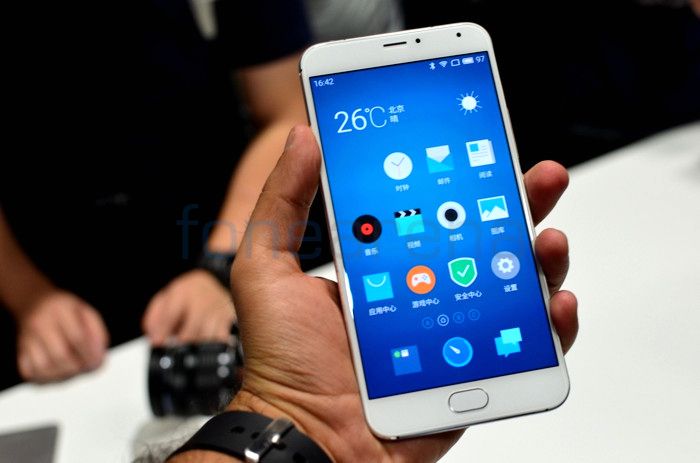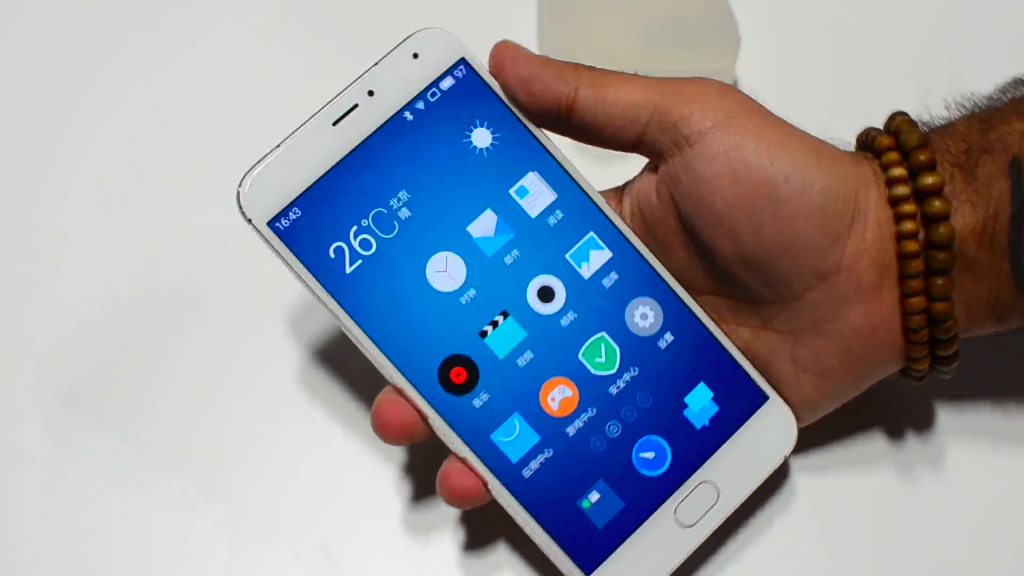

In Beijing, Chinese smartphone manufacturer Meizu launched a brand new device lies at the top end of their product portfolio. Called the PRO 5, the phone marks the launch of a fresh new brand dubbed PRO that will also incorporate accessories like premium headphones. We got a chance to checkout the product at the launch event. While its way too early to give a verdict, brief impressions indicate that Meizu could have a winner on their hands. Here’s our hands on impressions of the new Meizu Pro 5.
httpv://www.youtube.com/watch?v=7hvI5-sx7uE
Meizu PRO 5 specifications
- 5.7-inch (1920 x 1080 pixels) Super AMOLED display with 2.5D glass, Corning Gorilla Glass 3 Protection, 88-degree viewing angle, 10000:1 contrast ratio
- Octa-Core ( Quad 2.1GHz + Quad 1.5GHz) Samsung Exynos 7420 processor with Mali T760 GPU
- 3GB LPDDR4 RAM with 32GB storage and 4GB LPDDR4 RAM with 64GB storage, expandable memory with microSD
- Flyme OS 5.0 based on Android 5.1
- Hybrid Dual SIM (SIM 2 slot can also be used as a microSD slot)
- 21.6 MP rear camera with dual tone LED Flash, Laser Auto focus, PDAF, Sony IMX230 Exmor RS BSI sensor, 6P lenses, f/2.2 aperture, 4K video recording
- 5MP front-facing camera with OV5670 sensor, f/2.0 aperture
- Fingerprint sensor
- Dimensions: 156.7 x 78 x 7.5mm; Weight: 166g
- 4G LTE (TD-LTE / LTE-FDD) / 3G HSPA+ , WiFi 802.11 ac/b/g/n (2.4/5 GHz), Bluetooth 4.1, GPS, USB 3.0 Type-C
- 3050mAh battery


If you’ve spent any amount of time with Meizu’s other phones like the Meizu MX5 that we reviewed recently, you’ll find it hard to notice a change in design. Indeed, the design changes are minimal at best with a slightly slimmer profile and marginally tapered edges. The front of the handset has a 5.7 inch Full HD Super AMOLED display occupying most of the real estate on offer with slim bezels on both sides. You might be disappointed to hear about the absence of a 2K display here but the truth remains that the utility of such a panel remains questionable and it does cause significant battery drain as well. The point was emphasized several times by Meizu and is something we completely empathize with. On its own, the screen is well saturated and sufficiently bright both indoors and out.
A single groove can be found on the right side of the phone that packs both the volume rocker and power button in it. Tactile feedback is good and we had absolutely no trouble in locating and activating the buttons. Over on the left side is the dual SIM card slot wherein the second slot doubles up as a microSD card slot. We’re not very fond of this design choice as it does mean that you can’t use all the capabilities of the phone simultaneously. Along the bottom edge of the phone lies the USB Type C connector which is fast becoming ubiquitous. There are no capacitive buttons nor is there onscreen navigation. Instead, you use the home button to facilitate app switching, holding down the lock button switched off the display. This button also includes a fingerprint scanner that works exceptionally well. We’ve got to admit that this is one of the fastest fingerprint scanners we’ve encountered so far. Overall, in terms of hardware there’s little to complain. The aluminum construction is solid though it does add a reasonable heft to the phone that weighs 168 grams.
Internally the phone is powered by an Exynos 7420 Octa SoC, an Octa Core processor built on a 14nm FinFET process. This is paired with 3 or 4GB of LPDDR4 RAM depending on the configuration. You can chose between 32 and 64GB of storage on the two variants on offer. We think its a very forward thinking move on the part of Meizu to eschew a 16GB model altogether as the amount of storage is woefully tiny given the flagship stature of the phone and would lead to a less than compelling experience. Coming back to the performance, the phone gave us no reason to complain. Given that the specifications rival the Samsung Galaxy S6 and are top of the line components we never really expected there to be a lag anyway.
You should also look forward to the performance improving with the launch of the Flyme 5. Unfortunately the Meizu PRO 5 will not ship with Flyme 5 on board and even our preview unit had Flyme 4.5 onboard which means that we can’t really make a call on the software at the moment. All signs indicate however indicate that the update can only be good for the phone given how good the performance is already.
Talking about the camera, once again we have to limit our observations as the software isn’t completely optimized for the PRO 5. The sensor is a 21.16 MP Sony IMX230 CMOS sensor at the rear and a 5MP camera module at the front. The phone has multiple autofocus mechanisms in place including PDAF and Laser based focussing. The crux of the matter however is that the image quality wasn’t very good. There was significant loss in detail due to over aggressive noise reduction. This problem was something we noted across images and videos and we can only hope this will get better with the upcoming update and retail hardware.
All in all, the hardware on the Meizu PRO 5 is top notch but we’re somehow not completely impressed with the device due to the incomplete nature of the software. The camera as it stands was nowhere close to the level of performance we’d expect from the hardware but once again, this is something that can be solved through software. Core performance on the other hand is blazing fast, the design/build quality is very good and the fingerprint scanner is absolutely amazing. We are quite looking forward to putting this device through its paces once the final software is released and would refrain from passing a final verdict based on what are just preliminary impressions. If you have any questions about the phone, do let us know in the comments section.
Disclosure: Meizu sponsored our flights and hotel for the event in Beijing.
